#crowley not a reliable narrator
Text
I remember @neil-gaiman saying that Crowley is an unreliable narrator when telling the story of his fall.
I thought "Oh that can't be true"
Then I remembered this:

BITCH! This happened only a few days ago!
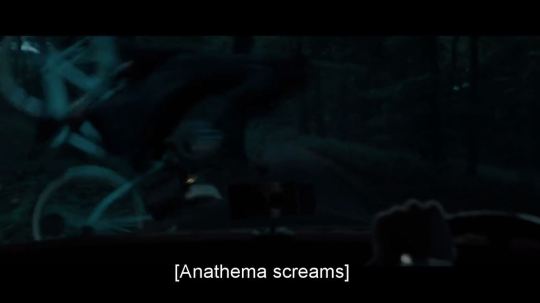
Not a scratch!? After Anathema Device hit your car!?
I see what Neil ment!
#good omens#crowley#ineffable husbands#aziraphale#anathema device#david tennant#crowley x aziraphale#good omens 2#good omens season 2#micheal sheen#good omens crowley#crowley good omens#crowley fell#crowley's bentley#neil gaiman basically said so#i love you neil gaiman#neil gaiman#neil gaiman is the best#crowley not a reliable narrator#the bentley#I'm in love with my car
338 notes
·
View notes
Note
Hello Mr. Gaiman,
First of all, HUGE fan of Good Omens (both the book and show). I don’t remember the last time I’ve been so enthralled by characters and a story. I absolutely adored Season 2 and have been recommending the show to all my peers. It’s also inspired me to get back into my art, so I thank you for that.
Okay, on to the question: I’ve been on my n’th rewatch of the show and am a little confused with something regarding how Crowley talks about his fall. Throughout the whole first season he’s going on about how he didn’t mean to become a demon and only ever asked questions, hung out with the wrong people, etc. But then in season 2 he talks about remembering fighting in the Great War (regardless of whether he recalls poor Furfur being there). I feel like knowingly fighting in a war against the forces of Heaven must come with the expectation or at least consideration of being cast out or punished in some way. So why say “I only ever asked questions” when he evidently did much more?
I'm not sure that Crowley is the most reliable of narrators when talking about his Fall.
2K notes
·
View notes
Text
So I was rewatching Good omens and I realized something.
Season 2 brings up Memory. A lot
Specifically Crowleys memory
In every episode something is said about it and I find this really interesting
I’m only going to bring up what I think are major, I want to note there are more instances than this. This is gonna be messy and a little disorganized since I’m just throwing my words on this post as I think of them and read the episode transcripts but I had to write it out.
In Episode 1 we see pre-fall Crowley and are introduced to our amnesiac archangel. This will be important later
We don’t see much of Crowleys memory loss in this episode but the biggest example I could find was the way Beelzebub had said Extreme Sanctions after Crowley misunderstood
It was as if they were expecting him to remember
In Episode 2 we get the first blatant hint of Crowleys memory loss
When Gabriel said he couldn’t remember, Crowley doesn’t say “Well try anyway”
He says “Yes you can.”
Crowley knew Gabriel could remember, he knew he could make himself remember. As if he knew it from experience.
Also in this episode we get Crowleys “I’m a demon, I lied.” As well as several other instances where he lies in this episode.
I also feel like his “Lonliness” is important to point out, because I feel like that goes much much deeper than “[I’m on] my side”
In Episode 3 we get Crowley and Gabriel’s Conversation about “Gravity”
Crowley knows what gravity is on a base level. But he says “I don’t remember” when asked why gravity exists and proceeds to give a very nondescript explanation
Now for Episode 4. This episode is actually what triggered me to start looking for these instances.
Because of Furfur
Near the end of the episode when Furfur enters the dressing room he mentions that him and Crowley were directly next to eachother during the Great War, as well as the fact Crowley used to jump on his back “Like a little monkey in a waistcoat”
And Crowley didn’t remember
All he remembered was going to war
Why does Furfur — A demon — remember but Crowley doesn’t?
In Episode 5 we get one of the most crucial ‘memory’ scenes imo
The aftermath of Crowley threatening Gabriel
When Gabriel tells Crowley “It hurts to remember, my head isn’t built for that” Crowley replies with “I know, do it anyway”
Again it sounds like Crowley is speaking from experience
The most important quote to me though is when Crowley says “I know, looking at where the furniture isn’t.”
Because after the fact he proceeds to ask Gabriel if he wants a hot chocolate
This wasn’t a sympathetic action. It was Empathetic.
He feels for Gabriel, he knows what it’s like to not know
Finally in Episode 6 we get context.
This is where the whole amnesiac archangel comes into play.
Before I get into that though I want to bring up Crowleys meeting with Saraquael. Because something interesting stood out to me while reading her voicelines. After Crowley asks “Do we know eachother?” Saraquael says “When you were an Angel” and pauses before she says the following voiceline “We worked together on the horsehead nebula”
Those were two different sentences. I’m definitely looking too far into this but to me it sounded like she knew he wouldn’t remember so she gave unnecessary context. This as well as the fact she didn’t respond when Crowley essentially said he didn’t remember her.
Back to my original point though, during this episode we finally learn how (and why) Gabriel lost his memories. Angels can remove their own memories as well as have their memories removed by other angels.
But clearly Furfur still has his memories, as well as Shax, Dagon, and Beelzebub
And anytime Crowley mentions “remembering” something it’s post-fall
Adding on Neil’s post about “Crowley not being a reliable narrator on his fall” as well as showing Crowley pre-fall in episode one leads me to believe there’s some foreshadowing in there and something happened to Crowleys memory.
But What?
Why doesn’t he remember?
What did they do to him?
#good omens#crowley#crowley good omens#good omens crowley#aziraphale#aziracrow#crowphale#ineffable husbands#gay omens#aziraphale x crowley#good omens aziracrow#aziracrow good omens#crowphale good omens#good omens crowphale#aziraphale good omens#good omens aziraphale#crowley loves aziraphale#aziraphale loves crowley#good omens theory
464 notes
·
View notes
Text
I was writing a meta post about the final fifteen and honestly it got so long an unwieldy that I gave up and just decided to live in denial land for a bit. But there is one piece of the puzzle I want to put out there, and that's how the flashbacks are edited, or one in particular.
I've seen a couple of great posts about how the flashback minisodes are edited in season two to be from Aziraphale's POV and not the Objective View, and if I was a better meta writer I'd have links for you, but I'm not, sorry. I've also seen a few posts discussing whether Aziraphale is a reliable narrator. That is definitely something we ought to consider when dealing with this sort of POV storytelling, but not entirely relevant to my post, but worth reading about if you have the time.
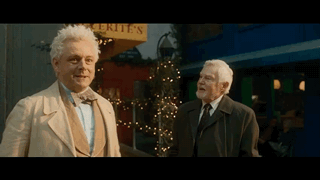
What I want to discuss is how the Metatron conversation is edited. We see Aziraphale go outside with the Metatron, this is the usual objective viewpoint. It then cuts to the scene inside the shop. We don't see the Metatron conversation again until Aziraphale is talking to Crowley. The way it is edited makes it very clear that this is not just a flashback but also Aziraphale recounting the tale. The use of "He said-" cut to scene, and "I said" cut to scene makes it as clear as the editor possibly can make it. It is a technique often used in editing to reduce exposition monologuing. Whether this is an accurate depiction of the Metatron conversation, we don't know but not actually relevant to my point (though worth thinking about).
What I want to point out is that Aziraphale chose to give Crowley four important pieces of information.
I don't want to go back to heaven.
There are enormous projects afoot. (consider that they have already discussed the possibility of a second Armageddon, though only Crowley knows about the Second Coming.)
They know about the Arrangement.
We could go together as angels.
He says all this in such a way that suggests he's fully drank the cool aid, but if we review the information without the dramatics it sounds more like a warning.
The use of double signalling ("it'll be like the old times, but even nicer" whilst shaking his head no) which occurs throughout the scene, this post and this video got me thinking about how deceptive Aziraphale is being. But he's not trying to deceive Crowley. He is trying to pass on the above information, hinting that he has a plan, whilst putting on a show for whoever is watching. He assumes Crowley is on the same page, and then it all falls apart when it becomes apparent that Crowley is really not. This is when he changes tack, and begins to panic.

He's left with the horrible task of trying to respond to Crowley's declaration positively, whilst not breaking the illusion. Which is why we get lines like "We can be together... as angels."
He also obviously sees them as a unit already (our car, our shop) and so it may not have he occurred to him that Crowley wouldn't just trust him and follow him into heaven. It's insensitive yes, but also not out of character for Aziraphale. I think this is the real kicker here, Aziraphale feels rejected because Crowley doesn't trust him enough to follow, and Crowley feels rejected because he doesn't feel good enough. Yet they are both clearly saying they want to be together.
I think the final few moments with Aziraphale and the Metatron is really what sells this idea to me. He is left undecided. He has the choice, abort mission and follow Crowley, or go ahead alone. He's devastated and you can see him wavering. If this was truly about him being excited to go back to heaven, I don't think we would see this indecision.
I can not decide just what is motivating Aziraphale to leave, whether he sees a sliver of hope to fix things in heaven, or whether he has decided to take on the role of hornet in a bees nest, but what is abundantly clear to me is that he has a plan and he wanted Crowley to help him, and Crowley said no. Or maybe he didn't. He was waiting by the car after all. Maybe this moment is what allowed him to move forward with a smile?
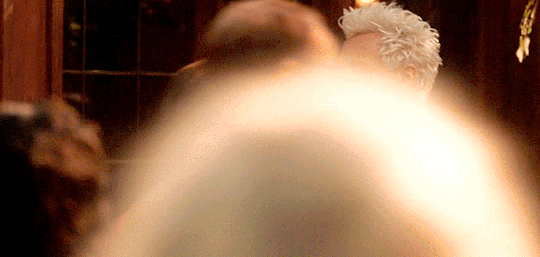
260 notes
·
View notes
Text
Doubt is the Essence of Faith - Questions, Prayer, and Crowley’s Relationship to the Divine
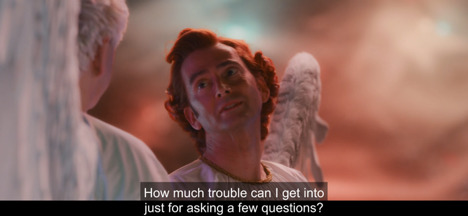
In the novel A Prayer for Owen Meany we meet a flawed pastor named Lewis Merrill who is suffering a crisis of faith. He believes that God has turned away from him due to his sinful thoughts and actions and that he is not worthy of forgiveness. As he silently wrestles with his personal demons, he preaches the most optimistic version of his belief to his congregation: doubt is the essence of faith, and not faith’s opposite.
In Good Omens, we see a similar theme play out throughout the series. While many angels and demons blindly order others or follow orders on the perceived will of the Almighty, it is those who question and who are open to questions who are ultimately closest to God. Let’s delve into the relationship between doubt and the divine, and particularly how Crowley fits into it.
God’s Presence in Good Omens
What do our characters know about God in Good Omens? For a world replete with angels, demons, heaven, hell, Satan, miracles, and nuns, there is comparatively little representation of God as experienced by the characters. (I am not counting the 4th-wall breaking narration from God in Season 1 since that is an audience-only view.) The characters of Good Omens see and hear very little from God, and the status quo is that God is distant, unreachable, unknowable - ineffible. As Crowley says, “There is just God, moving in mysterious ways and not talking to any of us.”
We only know of two instances where the characters hear from God: God speaks to Aziraphale when he leaves the Garden of Eden, and God speaks to Job at the end of his trials. The Metatron claims to be a conduit to God and to speak with Their voice: “To speak to me is to speak to God. I am the voice of the Almighty.” But the Metatron is not necessarily a reliable narrator, and even Aziraphale questions his claim by categorizing him more as a spokesperson. From an audience perspective, the more we see of the Metatron and his manipulative ways, especially when he is underscored by sinister music, the more it seems like he really speaks for himself.

Are You There, God? It's Me, Crowley
If God isn’t generally speaking to our characters, the reverse is also true. Communication is a two-way street and the characters in Good Omens rarely reach out to God. Prayer is conspicuously absent. Angels do not pray, nor do humans who come face-to-face with immortal supernatural beings. The Them, Anathema, Newt, Shadwell, Madame Tracy, the shopkeepers, Maggie, and Nina - not one of them engages in prayer when confronted with a glimpse into a world beyond their mortal sphere or even when facing Armageddon. We do not even see the Satanic nuns, a full on religious order, engaging in prayer to their dark lord and master.
While Aziraphale does not precisely engage in prayer, he does at least try to talk to God in Season 1 when he takes his concerns about Armageddon “all the way to the top.” The whole thing feels rather technical, however - more like a celestial phone call than a cry from his soul to the Almighty. When Aziraphale connects to heaven the exchange feels bureaucratic, beginning with him lodging a complaint about the conduct of Michael and the other angels. He is unable to reach God directly and at the end of the conversation, the Metatron “leaves the line open,” again more like a phone call than a prayer.

There are, however, three characters we see who engage in more traditional prayer. Job is the first character (chronologically speaking) we see speaking to God. Job is “literally God’s favorite human,” so it is unsurprising that he would commune directly. In his case it is unclear if he is actively engaging in prayer or simply receiving messages from God, but given that God starts off by saying “Job, if you have questions for me, I have questions for you,” it seems likely that Job is actively praying.
Jesus is the second character who prays. We briefly see him praying as he is nailed to the cross, entreating the heavens, “Father, please, you have to forgive them.” Again, this is unsurprising - Jesus is the son of God, has a direct relationship with Them, and is traditionally depicted as praying for the forgiveness of humanity while on the cross.
The third character who engages in prayer is… Crowley. In Season 1, Crowley turns his eyes heavenward and directly implores God not to destroy humanity: “Great Plan? God, you listening? Show me a Great Plan. Okay, I know you’re testing them, you said you were going to be testing them. You shouldn’t test them to destruction. Not to the end of the world.”

Crowley’s prayer is noteworthy when compared to what we see from Job and Jesus. For starters, it is significantly more substantial. By Crowley’s generally reticent standards it’s almost a monologue. It is also significant because instead of simply beseeching God, Crowley first questions God, then makes a demand, then suggests an alternative to what he believes God’s plan to be. Out of everyone we see speaking to God, Crowley has the most interaction and is also the one who approaches Them most like an equal.
In a second small example of prayer, Crowley says a quick “oh, God” under his breath in the confession scene after Aziraphale makes his heartbreakingly naive statement: “If I’m in charge, I can make a difference.” Here Crowley is subconsciously reaching out to God in his deepest moment of need, readying himself to try to salvage the future he sees going off the rails. He is the only main character we ever see directly reach out to God in distress.
Dangerous Questions
The characters within Good Omens share a common conviction that God is not to be challenged or questioned. In Season 1, Aziraphale is repeatedly told not to challenge God’s will via the Great Plan - after all, the war is to be won, not to be avoided. In Season 2 at the creation of the universe we see Aziraphale cautioning Crowley not to ask questions or make suggestions because it could get him into trouble. The baseline assumption is that doubting or questioning God can remove you from Their grace. Even Crowley believes that he was cast away from God because he asked too many questions. “That’s just how it started for me,” he tells Aziraphale in Job’s cellar as Aziraphale begins to question his blind loyalty to a God that would kill children. “See you in hell!”
It is also made clear that the angels and demons in charge of heaven and hell are not personally a fan of questions. In Season 2 we see the Metatron brooking no challenges from the archangels and sneering at Crowley’s history of “always asking damn fool questions.” In hell, Shax’s response to Eric’s repeated challenges and questions at the kick-off before the bookshop attack is to destroy him. Both heaven and hell are in the business of control - they give orders and expect obedience. Asking or answering questions only undermines their position of authority and control. But fallen angels, angels, and even the Metatron are not God and do not necessarily share God’s perspective.

Divine Questions
All evidence we have indicates that God actually loves questions. They sound delighted that Job has questions for Them, and They are definitely in the business of asking questions of the mortals They speak to. In fact, almost every statement we hear God make is in the form of a question. When They speak to Aziraphale, They say:
“Where is the flaming sword I gave you, Aziraphale, to guard the gate of Eden?”
And Their conversation with Job is almost entirely made up of questions:
“Do you know how I created the Earth? Where were you when I laid the foundations of the Earth, Job? Were you there when all the morning stars sang together and all the Angels shouted for joy? Do you know the rules of the Heavens? Did you set the constellations in the sky? Can you send lightening bolts and get them to report back to you? Did you give wings to peacocks, Job, or teach the ostrich to run?”

And interestingly enough, God is not the only divine entity to communicate through questions. When Satan appears at the end of Season 1, his dialogue is also almost entirely made up of questions:
“Where is my son? You? You’re my rebellious son? Come here. What? What did you say?
(As a fascinating side note, when asked a question about God in Good Omens on Tumblr, Neil Gaiman responded entirely with questions: “Does God know everything in this universe? Does God act on what God sees? Does God tolerate the behavior of her creatures?”)
In each of these examples we see that far from God being averse to questions, the act of questioning is integral to the divine. It is part of the process that God engages in when trying to make a connection. Job, as God’s favorite, is tacitly given permission to ask questions. Blind obedience is apparently not what is demanded - some measure of doubt, of questioning, is required to arrive at a sincere faith and relationship with God.
Crowley’s Relationship to the Divine
So how does Crowley fit into this? Crowley is a questioner at heart. From the beginning we see him asking hard questions. Standing on the wall of the Garden of Eden he immediately doubts the foundational actions he and Aziraphale have taken: “It’d be funny if we both got it wrong, eh? If I did the good thing and you did the bad one?” At Noah’s ark he peppers Aziraphale with questions about God’s intent, at the crucifixion he wonders what Jesus did to get everyone so upset, in King Arthur’s time he questions the value of what he and Aziraphale are doing as they cancel each other out, and on and on. Throughout this questioning he has little patience with the idea that the answers are unknowable. “Are you going to say ‘ineffable?’” he asks Aziraphale, witheringly, as he watches the Ark be loaded.
When it comes to his relationship with God, it’s clear that Crowley has many unresolved issues, particularly around the trauma of his fall and his separation from God's love. As many other people smarter than me have pointed out, his entire approach to plant care is simply a replay of his own trauma: identifying a flaw in a plant, expressing his personal disappointment in his role as houseplant God, holding it up as an example to its friends, destroying it/casting it out of its home, and threatening the remaining plants with the same fate if they don’t grow better. The bookshop fire is also experienced by him as a replay of his fall - the loss of someone he loves deeply, the fire itself, and even a physical fall when he is shot by a jet of water - that leads him to immediately get drunk and remember what it felt like to do a “million light-year freestyle dive into a pool of burning sulfur.” Crowley relives his trauma over and over.
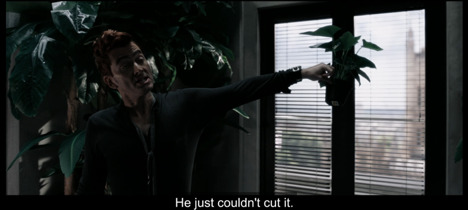
As a result of this unresolved trauma, Crowley can have difficulty acknowledging the reality of his fall and his status as a demon. Sometimes he downplays the fall itself (“I didn’t really fall, I just, you know, sauntered vaguely downwards”) as well as his responsibility for it (“I just hung around the wrong people;” “All I ever did was ask questions”). From our first introduction to him he does not behave as other demons do, responding to a ritualistic demonic greeting of “All hail Satan” with an unenthusiastic, “Uh, hi, guys.” He deliberately distances himself from hell by describing himself as “going along with hell as far as he can.” And perhaps most significantly he sets himself apart from other demons with his love for the earth, its creatures, its people, and all the lovely, clever things they invent.
Just as Crowley has never fully embraced and integrated his transformation into a demon, he has also never fully abandoned his subconscious associations as a former angel. When we first meet him as an angel in heaven at the start of Season 2, we learn that he is architecting the universe by creating nebulas, stars, and proto-planets and see the pride and love he holds for his creations. When things get tough on Earth and Armageddon approaches, his immediate thought is to return to the vast reaches of space to see Alpha Centauri or one of the nebulae he helped build, the last place where he felt a part of creation rather than of destruction. Similarly, when Aziraphale forces Crowley into action at the airbase in Season 1, Crowley’s primal instinct is to stop time and transport himself, Aziraphale, and Adam to a place that looks remarkably like the featureless white of heaven. In a callback to his previous life as an angel, he then uses the crank from the Bentley to restart time the same way he used a crank to start the engine of the star factory (perhaps even the same crank). He is even still sensitive to blasphemy, chiding Aziraphale for saying “oh my God!” and is clearly awed by and envious of the sight of Job speaking with God. “Just to be able to ask the question,” he says, wistfully.
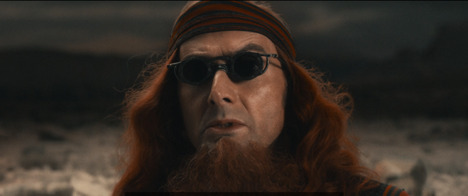
All of these interactions indicate that Crowley is not at peace with his current station, continuing to straddle a space in between angel and demon while wrestling with his past trauma. While there are times that Crowley leans hard into being a demon, he has many unresolved issues and doubts regarding his past life as an angel, the reality and meaning of his fall, and exactly what kind of demon he is now.
The Divinity of Doubt
So where does all this lead us as we enter Season 3? Crowley’s willingness to engage in direct prayer shows he is still subconsciously close to God. More than that, his propensity to constantly ask questions mirrors God’s behavior even more than God’s special favorites, Job and Jesus. Rather than being distanced from God by a tendency to ask questions, the available evidence points to questioning as being integral to a divine connection.
If anyone is to make a direct connection with God in Season 3, I predict it will be Crowley. His doubting, questioning nature is likely to be critical to the healing of his past trauma and the completion of his character arc. I would not be surprised to see Crowley get the opportunity “just to be able to ask the question” of God even if no direct answers are forthcoming. If doubt is the essence of faith, Crowley is well situated to to recover his - whatever that looks like for him - through the course of the final season.
#good omens#crowley#good omens 2#good omens meta#gomens#essay#long reads#good omens season 2#good omens s2
160 notes
·
View notes
Text
What does ‘Fallen’ mean?
Our favourite ineffable couple were both angels in the beginning. NKA Crowley was creating nebula and new stars, and Aziraphale (always known as Aziraphale) happened to be “in the right place,” helping Crowley know the creation of something that was obviously soooo loved.
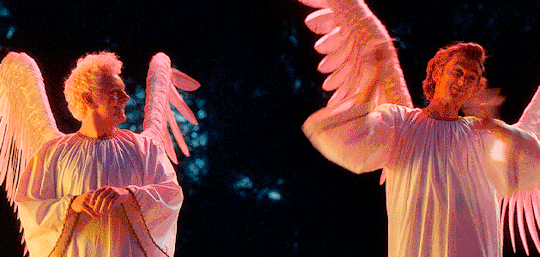
Then there is empty space. Crowley fell. They ‘why’ of this is questionable. As Neil Gaiman said, Crowley is not a reliable narrator for the fall.

But, if we do take all of the clues, it does seem that ‘asking damn fool questions’ was a crime associated with Crowley. So, perhaps his story isn’t the full picture, but the basic outlines are there.
So Crowley fell for asking questions, for wondering, for wanting to know why.

Then, we have Aziraphale. The beautiful angel who is so concerned about doing good. He goes directly against what he believes is god’s plan several times, in order to do what he believes is right, but does not get cast out if heaven.

What does this tell us?
It appears that the ‘sin’ Crowley was guilty of was not ‘hanging out with the wrong people’ or even questioning God. It was because he was HIM. And for some reason, he has become both of heaven and of hell. I think this is the best representation of this:

Crowley is who taught humans to be human. He wasn’t truly bad, nor truly good. He was the template that humanity drew from. Curiosity. Asking questions. What’s so bad about knowing the difference between right and wrong anyway?
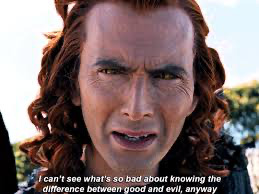

He and Aziraphale were both put on Earth from the beginning. Crowley taught the humans how to human. He also taught Aziraphale how to care for humanity.
And while doing this, he taught Aziraphale love (as humans understand it).

Which goes back to the initial question: Why did Aziraphale, who actively went AGAINST god, not become a fallen angel?
Crowley has taken on the sins of the angels that remain in heaven. He, in the book and the series, is not really a DEMON, as depicted by other demons in hell. He also doesn’t seem to have spent a lot of time in hell after Earth was created. He is KNOWLEDGE and LOVE. And he recognizes that the struggle between heaven and hell is eternal, but always takes the die of humanity.
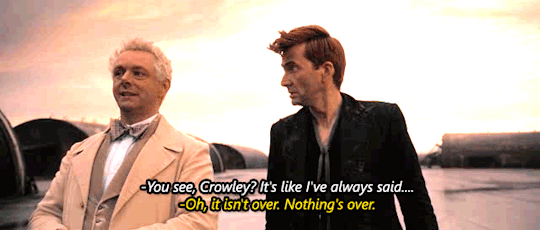
Likewise, Aziraphale was on Earth for as long as Crowley. He represents learning about faith, and how faith that is blind is not always moral, or compassionate. He is LOVE, and his struggle is similar to that of humans… what to do when what you believe God wants does not align with what is morally right. And in this, he gains knowledge and starts asking questions of his own.

Both fight, together on their own terms. Neither belonging entirely to heaven nor hell, both belonging to humanity, and yet struggling because of their unique place in the story of Earth, the story of heaven and hell, the story of rejection and acceptance, the story of belonging and love.
Which of these two have truly fallen?
Or, have neither?
#good omens#crowley#aziraphale#ineffable husbands#aziracrow#why do some angels fall#what is the criteria to get kicked out of heaven#how does this even happen
99 notes
·
View notes
Text
Everything You Ever Wanted to Know About The Crow Road, But Couldn't Get Through it To Find Out
Co-written by dbacklot and cheeseplants
WARNING: SPOILERS EVERYWHERE!!
Overall Premise: Books are clearly important to Good Omens and Neil & team have left us Clues. In S2E2, the xray trivia highlights a list of books they would like the audience to read. But even more specifically, there are names of certain books on the back of the chairs in the theater in the opening credits. Those books are: The Tale of Two Cities, Pride & Prejudice, and The Crow Road - twice!
What might this mean? One theory is that the chairs represent the seasons. The body swap in S1 is similar to how Carton, in Tale of Two Cities, takes his doppleganger's place in jail, sacrificing his life so Darnay could go free and be with his family.
Pride & Prejudice is clearly referenced in S2, with Crowley's proposal as a sort of mirror to Darcy's first proposal. (There's probably a whole lot more to unpack there - and if you like Austen, here are some thoughts about Aziraphale's favorite book, Persuasion, and how it may relate to the characters.)
BACK to The Crow Road. The title is shown on two chairs in the opening sequence, suggesting that it is related to both S2 and S3. Furthermore, we see the book multiple times in the show and it's the book Muriel reads at the end. As an aside, Neil Gaiman and Iain Banks were very good friends. Iain Banks died over a decade ago, so it is also likely a bit of a tribute to his friend.
So let's dig in and see why perhaps Neil keeps holding this book up and shouting Clue!
Side note: The book is long and most of the action happens in the final third, which can make it a hard read for folks. There's also a lot of characters and it can be tricky to remember how they are all related. There is a family tree BUT it has spoilers.
The Name: The Crow Road is a phrase used by the grandmother to indicate someone has died, ie - he's gone the crow road.
The Plot: This is the story of Prentice growing up with his immediate and extended family in Scotland. His Uncle Rory disappears in his early childhood. Some family members choose to believe Rory is still alive. After a hook-up with his Uncle Rory's former girlfriend as a young adult, Prentice starts gathering journals and writings from his missing Uncle Rory, who was (for a few years) a successful writer and traveler. Prentice eventually learns that 1) another Uncle, Fergus, had murdered his own wife and covered it up as a car accident and 2) Rory had figured this out and confronted him. Fergus then murdered Rory, hid all the evidence, and hired an acquaintance (who also traveled) to send matchboxes from bars across the world to Prentice's father, Kenneth. Kenneth, believed - as Fergus intended - that these were messages from Rory, indicating he was still alive.
Stylistically, Prentice's childhood memories and fragments from Rory's journals are interspersed throughout the book, much like the minisodes are in S2. It can take the reader a while to figure out who is telling the story or where this information is coming from. It is also unclear how reliable Rory is as narrator - perhaps this also plays into S2.
What it Might Mean:
Fergus could represent the Metatron. He is very powerful, rich, and conservative; he lives in a castle (Heaven?) and wants authority. Fergus also murders two relatives and hides those murders; the murder of his wife may have been inspired by jealousy over her sleeping with another man, an event which may or may not have happened.
Fergus also sets up fake messages!! The matchbooks are red herrings to make it look like Rory is still alive. As the Metatron relays messages from God, I can't get over the possibilities here. We have seen God speaking directly as recently as Job, but are the other messages real?
I can't help but wonder if the matchbooks and their use as messages inspired Neil to use the matchbook in S2. The matchbook in S2, incidentally, connects to all three minisodes - the quote from Job, 41:19 (reversed 1941), and the matchbox is from the Resurrectionists pub. So the matchbook contains not only Gabriel’s memories but refers to Azi’s as well?
Much of the book is about this missing uncle. Is a character (or their memory) missing in S3? I have theories, but its too soon to tell.
There's also an interesting theme of Prentice collecting his Uncle Rory's writings and records, including sending some corrupted computer discs to an expert in America to try to restore them. Given the emphasis on records ("It contains information in a tuneful way") and journals in S2, not to mention this trivia nugget - my brain is itching that there's a connection there.
Faith & Beliefs: The book talks about Faith a lot. Prentice believes in God and his father Kenneth doesn’t. And Kenneth doesn’t just reject religion, he wants his children to reject religion too. Prentice on the other hand desperately wants something to believe in - especially after a friend's death in an accident. This leads to a huge fall out - they end up not talking over it.
"'I mean, what's the big argument? Can't you just agree to disagree?'
'No; we disagree about that,' I shook my head. 'Seriously; it doesnt' work that way; neither of us can leave it alone. There's almost nothing either of us can say that can't be taken the wrong way, with a bit of imagination. It's like being married.'" (Ch 7)
Kennth seemingly taunts God - he climbs a church during a lightning storm and is struck dead. His uncle Hamish (one of Kenneth’s brothers) also represents the extreme version of Faith and ends up running a sort of cult, at least until Kenneth’s death.
What it Might Mean: The thread they pull through a lot is about meaning, and whether you can have meaning in life without God. Prentice gains Faith because his friend died senselessly; he wonders how can you have a world be so cruel. There must be a reason for it (this is sort of Az coded), and he turns to God to create the meaning for him.
BUT Kenneth’s argument is that you don’t need Faith for the world to have meaning (or at least that is my reading). It is wonderful because it is inherently meaningless (this is very existentialist, but I do think that’s the point). That Faith doesn’t do that, and just means you are looking outwards without looking at what is right in front of you. Which again, could be a Crowley way of looking at it, or at least where he is headed. Life is good as life, and doesn’t need God to make it so.
Hamish represents someone putting so much meaning into Faith that they lose all sense of Joy, he becomes distant. (One of my favorite scenes is Hamish doing a jigsaw puzzle with the pieces upside down - and cutting the pieces with scissors if they don’t fit right!)
The Romantic Relationships: Prentice is infatuated with a cousin (second cousin?), Verity. She is described as beautiful, in white/light colors, pure, lives with Uncle Fergus in the castle. There are legends around her birth - she was conceived under a tree during a storm. She is unattainable and eventually ends up with Prentice's older brother.
Ash, on the other hand, is almost literally the girl next door and Prentice’s long-term best friend. Her family is poorer and maybe has some domestic violence issues. She's always there for Prentice - literally a shoulder to cry on, sharing a bottle of whiskey, helping him sober up after said whiskey. There's obvious romantic tension from Ash’s side but she never pushes him and instead guides him along. And the book ends with a romantic resolution that feels very much like the final fifteen - except with a happier ending.
“- and I still didn’t feel I could tell her how I felt about her because she was going away now, and how could I suddenly say I love you when I’d never said it to anybody in my life before? How could I say it now especially, the night before she was due to leave? It would look like I was trying to make her stay, or just get her into bed. It would probably wreck this one precious evening that we did have, and upset her, confuse her, even hurt her, and I didn’t want to do any of that.” (Ch 13)
They finally kiss and spend the night together, both confessing their love. Ash has to leave the next morning to pursue a career opportunity in New York; Prentice is sad that she goes but re-dedicating himself to his studies and working towards a relationship together.
What it Might Mean: To me, Verity is very Heaven-coded and Ash is very Hell-coded. A big part of Prentice's arc (Prentice may represent Azi here) is getting over his blind infatuation with Verity and realizing the value and love he has with Ash. However, they also need to be apart and grow a bit before they can be together.
Other thoughts? Connections? Would love to hear your theories!!
@cheeseplants
#good omens#good omens s2#good omens 2#good omens thoughts#final fifteen#good omens meta#the crow road
78 notes
·
View notes
Text
My Good Omens Season 3 Predictions
I kinda just wanted to share my thoughts on what I think will happen in S3, and I want to know what everyone else thinks too! So without further ado, here are some of my predictions...
Most obviously, I think at some point during the ineffable reunion Crowley will call Aziraphale "Sssupreme Archangel" with a lot of sarcasm and bitterness in his tone. (I'd be crushed, but this is a need)
I think the season will open with a scene showing the fall of Crowley and other demons. It is unclear how it all went down since Crowley isn't a very reliable narrator. It would also match the opening scenes of S1 and S2 being at the beginning of the world
I think one of the minisodes will be about A & C interacting with Jesus Christ the first time around. This will parallel with the second coming arc that we all know is coming.
I think the season will take place at Christmas time. S2 mentioned the Whickber Street Christmas lights so many times and with the second coming there isn't a more perfect time for it all to go down. I also really want to see the characters at the holidays.
Let me know if you agree or have your own theories to share!!
#good omens#aziracrow#crowley#aziraphale#neil gaiman#the second coming#season 3#good omens season 2#ineffable husbands#christmas#im still thinking about them 4 months later
129 notes
·
View notes
Text
Parallels between Lord Jim and Good Omens (2)
I have rewatched GO2 at least 10 times now (still counting, obvsly), and every time I notice new easter eggs that emerge from the massive web of intertextuality that Neil Gaiman created for us here.
So today, I wanted to focus on the way Aziraphale came up with the “undercover” name “Jim” for Gabriel. He read it on the spine of a book: Lord Jim.

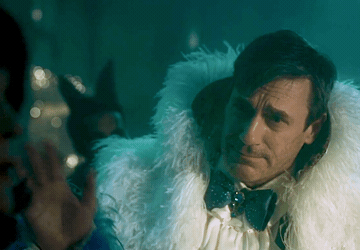
That book was written by Joseph Conrad (a Polish-British writer with dubious ideas about colonialism) and published in 1900. The plot basically follows the life of a young idealistic seaman called Jim who has to defend himself in a trial that concerns a sinking ship which he and other members of the crew abandoned in a storm, leaving it and the helpless passengers to their fate. The ship did not sink in the end, and he was the only member of the crew who was held accountable for his deeds by stripping him off his naval certificate. The trial is where he meets the narrator of the story, Marlow, who is strangely intrigued by the young man, who seems to be engulfed by guilt and shame over his morally wrong decision to leave the boat. The narrator tries to help Jim to his feet and lands him a job as a post manager at some remote colonial outpost. There he becomes a hero by capturing a local bandit. Later he falls victim to a scheme against him, and a pirate raids a neighbouring community and kills the son of their chief, Jim’s close friend. Jim then goes there, and the chief shoots him as a revenge for his son.
I mean, the most obvious parallel is that Gabriel gets named after Jim. He, too, abandoned his ship (Heaven; and the question here is, did he know it might be a sinking ship as well?) and was put on trial and lost his position as archangel before he came to Aziraphale for help. But that’s not all there is to it.
Let us start with the formal (concerning style and structure) aspects:
narrative structure:
“Marlow has complete control over the story … and he exercises his power in increasingly complicated ways. Time is broken up: in a single paragraph of narration, Marlow will reference the past, the present, and the future. By manipulating the flow of the narrative, Marlow is able to create juxtapositions and contrasts that highlight particular aspects of the story. He is a master at withholding information …” (Source: Sparknotes)
As I have already discussed in another post, this is more or less how narrative structure works in GO, too (S2 maybe more than S1, but this still applies to both). We get minisodes from the past that directly reference and juxtapose situations in the story that takes place in the present. Take, for example, the Job minisode, which gives us information about the development of Crowley and Aziraphale’s relationship, but we also see how devastating and hard it was for Aziraphale to realise that sometimes he had to lie (or do something considered wrong in heaven) to do the morally right thing. This sequence is juxtaposed with the relative ease he exhibits in the present day when he has to lie to heaven on a regular basis (in this case, about the miracle and hiding Gabriel, which is kind of a big lie, too). The show also plays with our understanding and expectations of how time works, as S2 starts with a scene that takes place “before the beginning,” which undermines dramatic structure as it has been known and accepted since Aristotle. It is also interesting to note that in S1, we have a strong sense of an almighty narrator, since god herself is narrating the whole time and she sure lets us know that she is playing her own ineffable game here. In S2, however, we don’t have a clear narrative voice. This might make it seem like the narration is more neutral or less meddled with, but in reality, it just makes things even less reliable and situations more ambiguous, as we have no single voice to interpret them for us. Someone is definitely “withholding information” here, and I guess we’ll have to wait for S3 to get the full picture.
language/style:
“Marlow constantly ponders the "message"--the meaning of Jim's story. His language is dense with terms like "inscrutable" and "inexplicable," words that denote imprecision and indecipherability, but which also possess a certain quality of uncertainty in themselves, as words. He struggles to name things, and is often reduced to wondering if there even is a meaning to Jim's story and his fascination with it. Sometimes he concludes that the meaning is an "enigma"; sometimes he decides there is no meaning to be found at all. Words are constantly being contested in this novel; at least three major episodes center around the misinterpretation of a single spoken word.” (Source: Sparknotes)
I mean, “inscrutable” and “inexplicable”? Why not just call it “ineffable”? I also love how Crowley seems to wonder about the meaning of things (especially the distinction between “good” and “bad”), as one of the first things we here him say in S2 is something like: “Do you ever ask yourself what’s the point. I mean angels, demons, heaven, hell … it all seems a bit … point … less.” And obviously, the whole show is full of misinterpretations of words (e.g., “what does your exactly mean, exactly? I feel like my exactly and your exactly are different exactlies”), or, as we are all painfully aware, a whole way of communicating with one another (“aim for my mouth, but shoot past my ear”).
Now for some similarities concerning informal (aka content) aspects:
moral balance and “naïve heroism”:
“Even more tortured is the analysis of idealism and heroism that lies at the center of Lord Jim. Jim is a young man who enters the world motivated primarily by fantasies of daring and noble deeds lifted from cheap novels. His ideals break down, however, in the face of real danger; they are, in fact, untenable when applied to any form of reality.” (Source: Sparnotes)
That sounds like both Crowley and Aziraphale in a way. They both set out as naïve idealists, and both of them learn (Crowley earlier and faster that Aziraphale) that their (heavenly) ideals do not hold in the complex reality of life. A lot of what we see in S2 is Aziraphale coming to terms with accepting that doing the “right thing” on earth often involves breaking his heavenly rules and allowing for “shades of grey.”
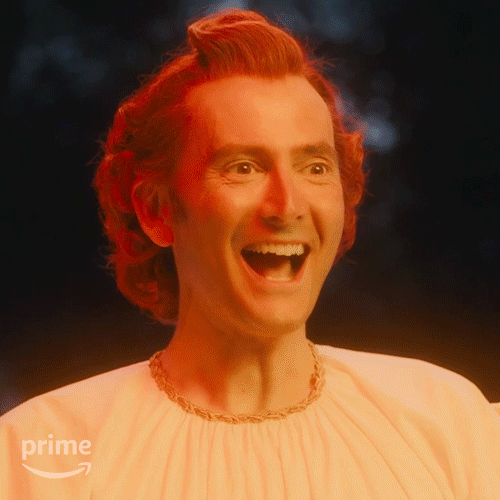
struggling to comprehend own identity and moral consequences of own actions:
Both the narrator, Marlow, and the protagonist of his tale, Jim, are trying to figure out their identity. Marlow seems to tell the story mainly to kind of make sense of identity itself but also of him personally, while Jim tries to make amends for his morally wrong behaviour and tries to manifest his identity (as a hero) through action.
In GO2, we have a lot of identity struggles and questions of “who am I?”: Jim the amnesiac angel is the most blatantly obvious case, but we also have Aziraphale negotiating his identity constantly, e.g., in the Job episode when he asks “Then what am I?” after having lied to heaven for the first time . And I mean Crowley is just on another level of liminal identity entirely, isn’t he?
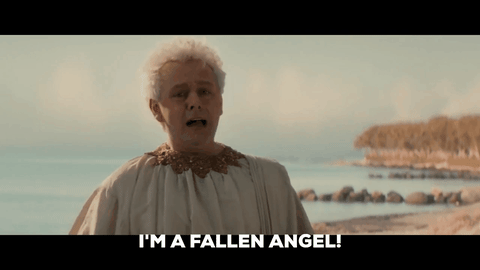
As a bonus (and I am probably going overboard here, but well), this is the description of Jim’s death:
“Then with his hand over his lips he fell forward, dead.”
The imagery reminds me of something…ahhh yes:
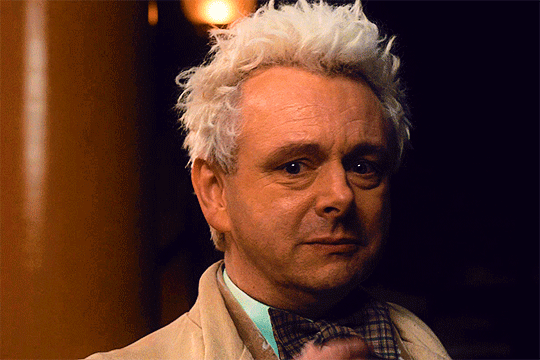
Feel free to add your thoughts in the tags or comments!
#good omens#good omens s2#aziraphale#ineffable husbands#crowley#go2#good omens 2#good omens meta#neil gaiman#crowley x aziraphale#meta#lord jim#go2 meta#jimmmm short for gabriel#thank you neil gaiman
154 notes
·
View notes
Text
How have I never noticed this before
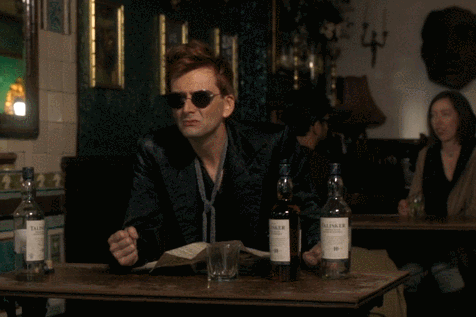
I never asked to be a demon. I was just minding my own business one day and then... "Oh, looky here, it's Lucifer and the guys." OK, the food hadn't been that good lately. I didn't have anything on for rest of that afternoon. Next thing, I'm doing a million-light-year freestyle dive into a pool of boiling sulphur.
Angels don't eat, it's even frowned upon. It's a pretty good clue that Crowley is not in fact a reliable narrator of his Fall
97 notes
·
View notes
Text
Radio Omens Thoughts
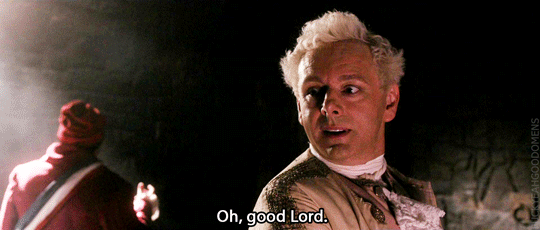
General -
First off, you can find the Radio Drama here uwuwuwu
The cast was 10/10 amazing, I love the audiobook but it was really interesting to hear how Neil and Sir Terry wanted everyone to sound before the show was even a thought. Dirk Maggs and Heather Larmour's Direction is so well done! I'm a huge fan of Hitchhiker's Guide so might try out his radio drama later...
The Them and Anathema are personal faves of the supporting cast so I’m always happy to get a new experience with those characters, Anathema’s gaydar going off the charts was perfect (“‘Angel’?” gets me good).
Just want to highlight Josie Lawrence as Agnes is perfect just like with the show, I’m so happy they didn’t change that after the radio drama, the adaptation made her so wickedly charming that I think was in the show but it goes by so fast with everything going on.
There are definitely parts in the book that are somewhat hard for me to get through, and I think the radio adaptation helped push those along a lot better. I do wish we got to hear the parts of Aziraphale spirit hopping around a bit before finding Crowley, but I just wanted to hear him talk more. Overall this is a good way to experience the book if you aren’t sure about reading it yet, or you’re like me and need help figuring out what it was I read in the first place.
Aziraphale and Crowley -
No notes holy shit 20/10 casting, they’re only in the drama just about as much as the book which makes me sad but their scenes were absolutely burning with how flirty they were.
They are 100% already married here and comfortable with each other, the lull of their routine is only disrupted by Armageddon which is really annoying so now they have to do their jobs.
Aziraphale acting as narrator for some scenes was a good choice, blah blah something about reliable vs unreliable narrator Crowley (I just can’t put it to words right now oops).
Peter Serafinowicz your Crowley gives me so much gender it’s insane, also when he’s doing the nanny voice???? Hello????? I could have a whole chapter of him and Aziraphale during that time just chatting with each other and little Warlock.
I overall really loved the respective performances of Peter and Mark, both portrayed the two with this freedom of doubt and lots of mutual love. Crowley still wants to keep Aziraphale safe and he’s confident he can even as events get worse, the latter is stubborn knowing he’s right but confident that his demon will catch up and figure it out (even if begrudgingly so). They already have their happy ending, it can only get happier from here after they save the world.
I definitely recommend Radio Omens, it really is part of the golden triad of experiencing the story.
My personal recommendation: Book, Show, Radio
If you have a harder time starting books (be it reading or listening) then: Show, Book, Radio
Next on my list is the audiobook with the show cast, but I’ll take a break for a bit since every time I read/watch the original story I get so worked up I need to calm down for about a month or so :’)
What do YOU all think of radio omens? Please tell me or send me Radio Omens headcanons and opinions. I need them badly chomping at the bit here!
#good omens#radio omens#neil gaiman#terry pratchett#aziraphale#crowley#aziracrow#ineffable husbands#anathema device#agnes nutter#my writing#my words
141 notes
·
View notes
Text
It should be no secret that I adore Oltyx. He's one of my favorite 40k characters. Which is amazing because let's be real, he's an insufferable little shit who spends most of the books consumed by entitlement, paranoia, or both. He's just so damn well written, the elements that make him awful (which also form the starting point for his character arc) don't quite overshadow his redeeming qualities (which prove he is a person worth giving the opportunity to grow).
Those early chapters do some serious heavy lifting, character-wise. Oltyx comes out the gate swinging for "worst protag of the Year award". He's bitter, he's convinced all of his problems are someone else's fault, he is needlessly cruel to his subordinate (ready to kill Neth just because one grot made it to the stairs). A real winner, right here. Except for two things:
1) he doesn't want his soldiers to die. Sure, he justifies this with facts and logic. Attrition will eventually diminish his forces, leaving him unable to defend his shitty planet, and he isn't getting reinforcements anytime soon. But still, he wants to preserve the lives under his command. He wants to create a "new way of war" which is surprisingly sympathetic for someone who acts like a surly teenager (more on THAT later). Bonus that he does not in fact kill Neth
2) his flashback where he sees Djoseras' first lesson to him. Where we see that Oltyx is not exactly a reliable narrator regarding his elder. And if he's wrong about Djoseras, what else is he wrong about? The narrative is doing something here.
That second point is super important. Because there's a huge difference between reading an asshole protag where the author knows they are an asshole vs. where the author doesn't. The former can be incredibly satisfying as you watch someone grow and change. The latter is annoying AF. That flashback (for me) is like a footnote from the author promising "hey, not all is as it seems, bear with me."
Oltyx's hints of compassion are the incentive.to.give him a chance. Which is then further cemented when we enter the tomb and get to see Oltyx's affection for Yenekh, the first character we see Oltyx caring about. Proof that he has relationships that matter. He doesn't actually hate everyone and everything. And as the narrative continues, we peel back the layers to see what Oltyx actually is.
While I reading those opening pages, I joked to my spouse that Oltyx sounded like a teenager who listens to too much emo music. Turns out that was not actually a joke, that was the entire character. As we get more of his interactions and flashbacks, we are shown someone trapped in perpetual adolescence. Who had the compassion beaten out of him by war, trauma, and neglect (or literally sliced out of him, fuck Hemiun). The more you see of Oltyx the more heartbreaking he becomes. Not because he isn't terrible (he is) but because he didn't have to be. Yet it is so understandable why he is. The lessons he was taught even by the people that loved him (life has no value, compassion is a weakness, lies will come from those closest to you) twisted a kind soul into a conflicted mess. It excuses nothing but explains everything.
But despite ALL OF THAT Oltyx still tries to do the right thing. He tries to save the dynasty that exiled him, he tries to fight beside the brother he taught himself to hate, he tries to resist the madness that he thinks will make him a monster. He literally has the mind of an eighteen year old, trapped in a metal body that is slowly destroying what little sanity he has left. That's a lot!
Crowley had a fine line to walk writing Oltyx, making him sympathetic but not dulling the impact of his darker traits. For my money he did it brilliantly. Oltyx is my precious son who has done everything wrong and I love him.
#necrons#wh40k#Oltyx#twice dead king#yes he is a little shit but considering that he is also perfect and precious and must be protected at all costs#what angsty music is oltyx listening to?#evanescence was my middle school go to#i think he'd appreciate MCR#he had a lot of time to fill tho#needs more music recs
75 notes
·
View notes
Text
What we know and don't know after Good Omens S2
Honestly, it's mostly what we don't know.
This was originally meant to be an intro to Before the Beginning (part 1.5.) - a post in my series of posts discussing what we learn from the opening scene of S2 - but I've decided to make it its own thing after all.
I just enjoy reminding myself and others what we know for sure and what is just a theory or a headcanon. So here I go.
#1 The Fall
I've already written about the Fall shortly after S2 aired: Implications of Metatron's offer
My points still stand, except now that I think about it I might have put too much stock in Metatron's words. I think they prove less than I was willing to believe back then, as it's not difficult to imagine they might have all been a bluff.
In short: we don't know what the Fall is and how it actually works.
All that we know is that it happened once, and in the process, part of the angels were transformed and became demons.
The rest is just a long list of questions.
#2 Crowley's Fall
We're not much wiser when it comes to the circumstances of one specific Anthony J. Crowley's Fall.
Let's look at the very few facts we have:
In S1 Crowley claims that "he didn't really fall, he just sauntered vaguely downwards", "he only ever asked questions [and] it was all it took to be a demon", and "he didn't mean to fall, he just hung around the wrong people".
Neil Gaiman suggested more than once that Crowley isn't the most reliable narrator when it comes to his own Fall, and while he's not as bad as Heaven believes, he's also not as good as he thinks.
In Job's minisode, when Aziraphale is on the brink of questioning God's sense of justice ("Yes. But..."), Crowley tells him that was how it started for him too.
We learned from Furfur that Crowley actively took part in the dubious battle on the plains of Heaven just before the Fall.
In the finale, Metatron isn't the slightest bit surprised Crowley didn't take his offer and comments he "always did want to go his own way. Always asking damn fool questions too."
What does it all tell us? Nothing specific, except that perhaps we were a bit too quick to take Crowley's word that he hasn't done anything that would warrant any kind of punishment.
Questioning God's way of doing things was just how it STARTED for him. Asking damn fool questions was something he did TOO.
In short - we have no idea what really happened.
#3 Memory erasure
It's one of those popular headcanons that have been around at least since S1 and got canonically confirmed in S2.
We now know it's something that exists.
And that's where our knowledge ends.
Everything we really saw in the show was Gabriel getting sentenced to having his memories of being Gabriel removed. Then he very quickly moved his whole self to the fly to save it and we don't actually get to see what the result would be if Heaven did it. Would he be the same returned-to-factory-settings goofball or would he be given some memories to fill the blank spaces?
Is it actually possible to plant false memories in someone's head or can you only delete them?
Are memories really erased or just made inaccessible? Gabriel could still force himself to access some of his old memories. Was it because that's how it works and everybody could do it theoretically or was it because the memory-erasing procedure wasn't performed properly in his case?
We know it can be done remotely, but what is the range?
How precise and selective can it be? Gabriel was meant to forget everything. Perhaps that's the only way and you cannot pick and choose what one remembers or not.
We do not know.
#4 Aziraphale and Crowley's relationship
In S2 we have learned that they knew each other before the Fall. But all we saw was one meeting that appeared to be the first one to boot, judging by the fact that Aziraphale introduced himself.
We don't really know if they met again after that, how well they got to know each other, and how close they became.
It's not impossible, that when Aziraphale insists he knew the angel Crowley was, he's not even right about that...
#5 Aziraphale's and Crowley's memories
Last but not least, whatever Aziraphale and Crowley knew initially and whatever events they were part of or witnessed, we have no way of knowing what memories they've kept AND if they're even aware one or both of them might be missing something.
There may be important things that only one of them remembers but since I doubt they've ever compared notes, he operates under the wrong assumption that the other is aware of it too.
Anything is possible, really.
I've seen many convincing theories regarding all of the above and plenty of delightful headcanons. I'm just listing it to keep in mind all the questions remain open.
60 notes
·
View notes
Text
You Say Potato, I Say Excellent! Or blocking, dialogue and legacy of morality tales in ‘The Resurrectionists’ minisode PART I
Alternate title: how Aziraphale’s naivety in this episode was supposed to make you a bit outraged
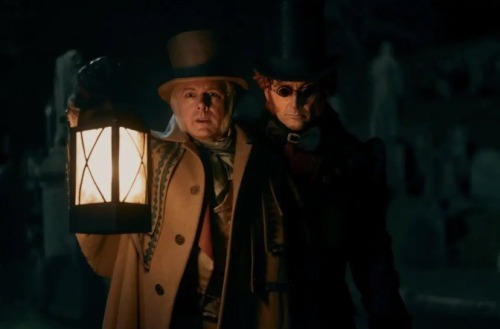
I have to shout out to @bowtiepastabitch for their AMAZING historical analysis of this minisode - it prompted me to finish this long ramble that has been drifting in my notes. Anyway, I have a major obsession with the ways blocking and dialogue interplay in Good Omens - you can check out my analysis of the blocking in the flashbacks in S1. But The Resurrectionists is really something special. This got so long I am splitting it into two parts. See Part II here!
I should start with three important caveats that brought me to this analysis -
If we accept that S1 is narrated by God, then I propose that S2 is being told from the viewpoint of our Ineffable Man Shaped Beings - and they are NOT reliable narrators.
All three minisodes share a feeling of being… stories. They feel like a slightly exaggerated version they might be told between two old friends sitting in the back room of a bookshop, soused off wine and whisky. Like a journal entry that you don’t actually expect outsiders to see.
All three minisodes have some relation, in style and structure, to film and literature. I'm focusing on the lit aspect here. A Companion to Owls is very illustrated bible. Nazi Zombies from Hell is a pulp fiction master class. So what is The Resurrectionists? A morality tale.
My first thought when we opened on the romantic graveyard date in Edinburgh was “OH it’s like a penny dreadful!” but it didn’t take me long to reassess. Morality tales are a genre of children’s literature that was extremely popular in the early 1800s where the minisode is taking place. But THIS morality tale itself is a more nuanced version of these stories, more along the lines of what an author important in the Good Omens universe would pen. So, first, a little bit of history behind morality tales and a very important author to know, then we get to the blocking and dialogue!
Morality Tales for Children
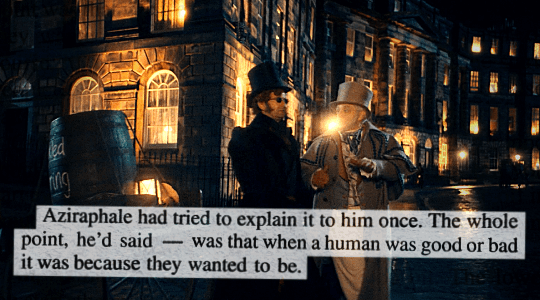
There had long been differing views in European circles of thought about the nature of children - were they born innately tainted by Original Sin, or were they born as blank slates? In the late 1700s to early 1800s, the view of the blank slate was winning with the help of highly influential educators like Friedrich Froebel (who coined the term kindergarten and emphasized the importance of play in learning.)
At this same time, there was a rise in literature produced specifically for children. One of the most popular children’s genres? The morality tale. These stories showed Good triumphing over Evil and the importance of leading a respectable, Christian life. The stories were extremely binary, black and white in their presentation of morality, something which deeply influenced many authors who were raised reading them. Authors like G.K. Chesterton.
G.K. Chesterton
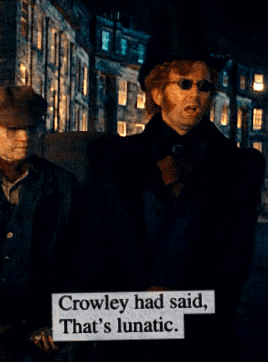
Over his career, Chesterton wrote several plays, 80 books, 200 short stories, 4,000 essays, and several hundred poems. He’s an interesting guy, but suffice to say for our purposes - he was deeply Christian, and his work contains a lot of religious themes and symbolism which he used to write serious commentary on politics, economics and philosophy. If you haven’t read the book, you should know that it the dedication reads thus:
The authors would like to join the demon Crowley in dedicating this book to the memory of G.K. Chesterton.
In fact, Crowley says in the book that Chesterton was “The only poet in the twentieth century to even come close to the Truth." So it is probably relevant that Chesterton had opinions about children’s morality tales. He once wrote -
Many people have wondered why it is that children's stories are so full of moralizing. The reason is perfectly simple: it is that children like moralizing more than anything else, and eat it up as if it were so much jam. The reason why we, who are grown up, dislike moralizing is equally clear: it is that we have discovered how much perversion and hypocrisy can be mixed with it; we have grown to dislike morality not because morality is moral, but because morality is so often immoral. But the child has never seen the virtues twisted into vices; the child does not know that men are not only bad from good motives, but also often good from bad motives. The child does not know that whereas the Jesuit may do evil that good may come, the man of the world often does good that evil may come.
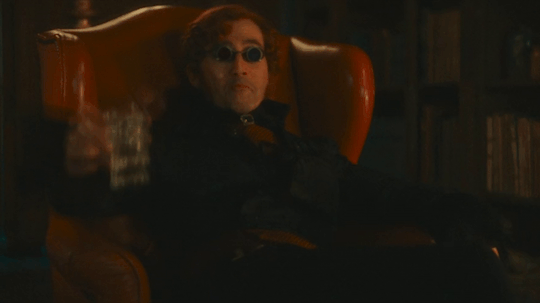
In summary, we know that children’s morality tales were supposed to teach important lessons about Good and Evil. We also know that later authors like G.K. Chesterton were aware of this genre and it influenced their writing (which in turn informs the Good Omens universe). So why pick this framework for this minisode? Because it is FRUSTRATING to watch, on purpose. We are meant to be annoyed with how Good has so little relation to right, to see how complicated doing real good can be, and it lays out a strong case for the complete inadequacy of black and white world views - and not just religious ones.
So (grabs gloves and a knife) let’s dissect the blocking and dialogue, shall we?
Part II: Blocking and Dialogue
#good omens#good omens meta#the resurrectionists#just theatre kid things#history is my jam#look the blocking has me feeling things#shades of gray
54 notes
·
View notes
Note
Have you thought much about how the decision to cast David in Good Omens came about? Michael had already been cast and David was cast second. According to Neil, he decided he wanted David for Crowley as he was writing the 1941 church scene. You know, the romantic, coming down the aisle towards your boyfriend who is waiting for you scene. That one. That's the moment Neil thought, "This should be David."
He'll insist it was because David could do the hopping about on his feet while delivering his lines, but Neil is not always a reliable narrator.
I hate that I have to keep having to hand it to him but he was the first guy to go “I need to see David Tennant and Michael Sheen melting in each other’s presence after having had a lover’s spat the previous time they met up” and he was so right for it.
34 notes
·
View notes
Text
I've been doing a lot of analysis on Good Omens recently so here's some things I've gathered from the scene in S1E5 where Crowley is talking to himself drunk in a bar after he believes Aziraphale had been killed.
(This might not be new for everyone, this is also just my opinion and thoughts, I'm just having fun so take what I'm saying with a grain of salt lol)
Before going into the quote and what each part means, I would like to specify that Neil Gaiman stated that Crowley isn't the most reliable narrator of his own fall. From this I am assuming that although most of what Crowley is saying aren't direct lies, but that he likely sugarcoated and holds back some information. Neil also stated that Crowley (before the fall) wasn't as innocent / good as he paints himself to be, and isn't nearly as evil as Heaven would like to imagine.
“I never asked to be a demon. I was just minding my own business one day and then, oh look here, it's Lucifer and the guys. Food hadn’t been that good lately, didn’t have anything on for the rest of the afternoon. Next thing I’m doing a million lightyear freestyle dive into a pool of boiling sulfur.”
There are a few things that we can take out from this quote.
“I never asked to be a demon.” This is the second time Crowley specified his intent with falling. He never wanted this, he never meant for this to happen. Although he doesn’t directly say that he feels it's undeserved, it is clear that he in some ways regrets his actions and that the intent of falling wasn’t there.
“I was just minding my own business one day.” Here's what I believe is very clear sugarcoating on his behalf. He paints himself as innocent and unknowing of what would happen. Although it may be true to some extent that he didn’t realise it would lead to him and others falling. It would be wrong to assume that it wasn't also his own doing which caused him to join Lucifer and to join the rebellion and further, participate in the great war.
“Look here, it’s Lucifer and the guys.” These are the people he blames for falling, the “wrong people” he hung around with so to say. (There was a theory at some point that Crowley was Lucifer and he was talking about himself in the third person but this has been debunked by Neil Gaiman who said that Lucifer turned into Satan.) In this way he is also somewhat sugarcoating (imo) because he makes it seem as if others dragged him into the rebellion and the war, while yes there may have been peer pressure and outside influences, Crowley is someone who makes his own decisions and doesn't just go along with something he doesn't agree with.
“Food hadn’t been that good lately, didn’t have anything on for the rest of the afternoon.” Another instance of Crowley sugarcoating what had happened, I personally find it hard to believe that just one random afternoon a large group of angels just on a whim decided to rebel and start a war, as well as that I find it hard to believe Crowley joined the rebellion and war because “the food hadn’t been that good lately”. There was definitely a more serious and substantial reason for the rebellion and why Crowley joined. His language here also plays it off as no big deal, while clearly, it is a big deal, he just has a hard time confronting that reality.
“Next thing I’m doing a million light year freestyle dive into a pool of boiling sulfur.” This line is very different from the others, as his tone also shifts slightly, you can clearly feel the hurt and pain of this memory. From this we also learn that when an Angel turns into a Demon, they fall into boiling sulfur. But clearly to Crowley, this is a very painful and traumatic memory, I just wanna give him a hug.
#good omens#crowley#good omens theory#good omens analysis#crowley good omens#anthony j crowley#crowleys fall#i want to give him a hug
29 notes
·
View notes